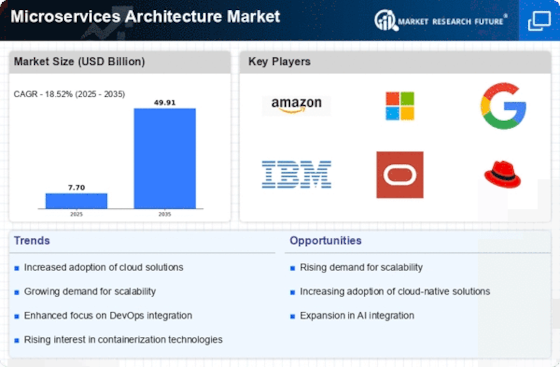Top Industry Leaders in the Microservices Architecture Market

Microservices Architecture Market: A Symphony of Scalability and Agility
The Microservices Architecture market is humming with activity, orchestrating a dynamic melody of growth and innovation. As organizations scramble to achieve agility and resilience in the digital age, microservices, with their independent, loosely coupled service design, have become the preferred conductor. This market, projected to reach a staggering USD 8825.79 million by 2028, is witnessing a captivating interplay between established giants and nimble upstarts, all vying for a leading role in this digital transformation symphony.
Key Players:
- Cognizant
- Salesforce, Inc.
- Infosys Limited
- International Business Machines Corporation
- Datawire
- Microsoft Corporation
- Software AG
- Mulesoft
- Nginx Inc.
Strategies Adopted:
Each player is orchestrating their own melody to attract their audience:
- Platform Offerings: Building comprehensive platforms encompassing development tools, containerization technologies, and service governance capabilities makes microservices adoption seamless.
- Cloud-Native Focus: Optimizing solutions for cloud environments, with features like serverless computing and automated scaling, aligns with modern IT infrastructure trends.
- Open Source Advocacy: Open-source frameworks and tools democratize microservices development, attracting cost-conscious organizations and fostering community collaboration.
- Industry-Specific Solutions: Tailoring platforms and services to specific industries, like healthcare or finance, addresses unique regulatory and compliance requirements.
- Acquisition and Partnerships: Strategic acquisitions and partnerships expand capabilities, reach new markets, and bring together complementary expertise.
Market Share Analysis Factors:
Understanding the market's rhythm requires focusing on the right instruments:
- Solution Breadth and Depth: The comprehensiveness of offered tools, platforms, and services across the microservices lifecycle, from development to monitoring, influences market share.
- Cloud Integration and Portability: Seamless integration with cloud environments and cross-cloud portability are crucial in the hybrid and multi-cloud world.
- Security and Compliance: Robust security features and adherence to industry regulations resonate with enterprises prioritizing data protection and privacy.
- Developer Experience and Ease of Use: Intuitive tools, developer-friendly documentation, and community support attract talent and accelerate microservices adoption.
- Industry Focus and Vertical Expertise: Demonstrating deep understanding of industry-specific needs and providing tailored solutions strengthens market position.
New and Emerging Players:
Fresh talents are adding new notes to the market's melody:
- Kong: This API gateway specialist provides solutions for API management, security, and observability, addressing a critical aspect of microservices architecture.
- ServiceNow: Building on their IT service management expertise, ServiceNow introduces microservices-based solutions for incident response and IT workflow automation.
- Dapr: This open-source distributed application runtime simplifies cloud-native development and enables efficient communication between microservices.
- Linkerd: This service mesh platform facilitates service discovery, load balancing, and traffic management, enhancing observability and control in microservices environments.
Investment Trends:
Players are investing in key areas to amplify their performance:
- Artificial Intelligence and Machine Learning: Integrating AI for automated security scans, performance optimization, and predictive analytics unlocks new efficiency gains.
- Serverless Computing: Investing in serverless infrastructure and tools aligns with the demand for cloud-native, scalable microservices deployments.
- Edge Computing: Expanding solutions to support edge deployments enables real-time processing and decision-making in geographically distributed environments.
- Monitoring and Observability Tools: Developing advanced tools for service health monitoring, incident detection, and root cause analysis ensures robust microservices operations.
- Talent Acquisition and Training: Upskilling existing workforce and attracting specialized talent with deep microservices expertise is crucial for success.
Latest Company Updates:
- Oct 26, 2023: Red Hat launches OpenShift Service Mesh a managed service mesh offering for deploying and managing microservices on Kubernetes.
- Dec 12, 2023: Microsoft expands Azure Spring Cloud adding new features and integrations for building and deploying microservices on Azure.
- Jan 10, 2024: The Linux Foundation announces formation of Microservices Working Group aimed at developing best practices and open-source tooling for microservices development.










